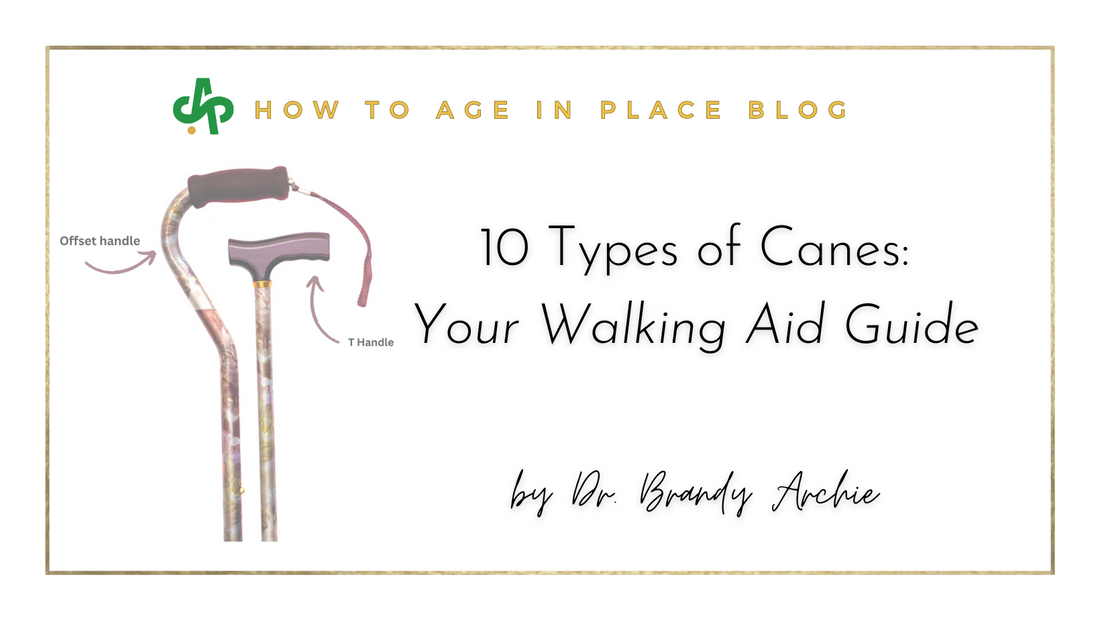Selecting the right cane is more than just a matter of personal preference— it's about enhancing your mobility, safety, and independence. The right cane can significantly improve balance, reduce the risk of falls, and provide the necessary support, making everyday activities smoother and safer. When choosing a cane, consider factors like stability needs, handle type, and weight capacity. Before we dive in, here are the key points you'll learn in this article.
Key takeaways
- Canes enhance mobility, safety, and independence by improving balance, reducing fall risk, and providing support.
- Consider stability needs, handle type, and weight capacity when choosing a cane.
- Different types of canes include single-point, quad, offset, folding, seat, T-handle/crook, bariatric, hemi-walker, fashion, and smart canes.
- Consult an occupational therapist or a physical therapist for personalized recommendations to make sure the cane suits your specific needs.
Let's start by exploring the different types of canes available.
Key To Selecting the Right Cane
A cane isn't just a support tool— it's a companion that aids your daily mobility. To choose the right one, consider how much balance support you need, what handle type suits your grip, and the weight capacity you require. Just so you know, the knowledge provided in this article is general information. If you'd like specific recommendations or assessment, you should consult a local physical therapist or schedule a virtual visit with one of AskSAMIE's occupational therapists at a time that works for you!
Types Of Canes

Single Point Canes
Designed for minimal support, the single-point cane is ideal for those who need a slight help with balance. Its simplicity in design is matched by its effectiveness in providing a little extra stability. It's also a great way to indicate in public that you need a little more space for safety.

Quad Canes
With a four-footed design, quad canes offer enhanced stability. They're perfect for individuals who need a fair amount of substantial support and balance assistance. They're also great if bending over to pick up a cane is unsafe because these canes automatically stand on their own.

Offset Canes
These canes feature an offset handle, providing ergonomic benefits, especially for users with wrist pain or arthritis. The design helps distribute weight evenly, reducing strain on the wrist. They can come with four feet or a single foot.

Folding Canes
Folding canes are the epitome of convenience. They're easily collapsible, making them a perfect choice for travelers or those who require a cane on an occasional basis for incidental support.

Seat Canes
For those who need frequent breaks, seat canes offer a built-in seat. This feature is incredibly useful during long walks or when you need to rest periodically if your balance is good enough to perch on the small seat.

T-Handle or Crook Canes
The traditional design of T-Handle or Crook Canes isn't only functional but also aesthetically appealing. These style handles usually have a single point foot at the end and provide slight assistance with balance.
Bariatric Canes
These are designed to support higher weight capacities. Bariatric canes are robust and provide enhanced stability for heavier users. They can come as a single point cane, quad cane, or hemi-cane style.

Hemi-Walker or Hemi Cane
A hybrid between a cane and a walker, the hemi-walker or hemi cane is beneficial for users who require the support of a walker but only have one hand available to use on a device.

Fashion Canes
Fashion canes focus on design and style without compromising functionality. They are for those who want to make a style statement while having reliable support. You can find the most patterns and colors in the single point cane style.

Smart Canes
Incorporating technology like GPS, object detection, and emergency alerts, smart canes offer additional safety features. They're ideal for users who value added security and technological assistance to accommodate for vision or cognitive challenges.
Pick The Right Type Of Cane For Your Needs
Choosing the appropriate type of cane is crucial for your mobility and safety. It's important to consult a healthcare professional for personalized recommendations, ensuring the cane you choose not only suits your specific needs but provides the right amount of support to improve your safety. Using a cane that isn't as supportive as you need can result in falls, so let us help you get it right the first time.
Schedule a virtual visit at AskSAMIE, where our occupational therapists can guide you to find the perfect match for your lifestyle and needs.




